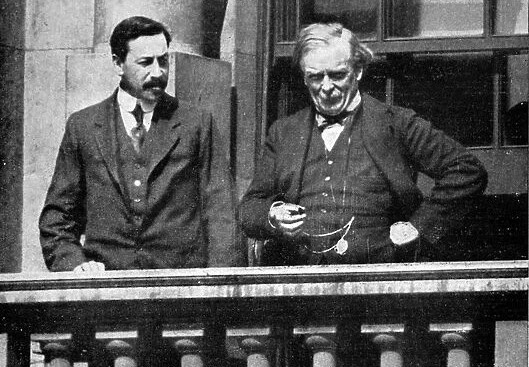The first governor-general of Palestine: Who is Herbert Samuel?
Herbert Samuel, who entered politics from the Liberal Party staff in 1902, was one of the first Jewish members of the British cabinet. He was one of the triggers of the process that led to the Balfour Declaration by putting forward the idea of establishing a British mandate in Palestine in 1915.

On June 30, 1920, Herbert Samuel, who was appointed as the governor and high commissioner of Palestine under British mandate, took over his duty with a receipt signed "One Palestine, transaction completed".
With the outbreak of World War I, Samuel's involvement with Zionism increased exponentially, even though he was not a member of the World Zionist Organization.
In 1915, he proposed the idea of establishing a British protectorate over Palestine after the war, and in a memorandum titled "The Fate of Palestine" he described how Jews around the world had waited "for more than 1,800 years" to return to Palestine, their connection to the land "almost history" He argued that it was as old as himself.
Samuel's ideas increased the British government's pro-Zionist orientation and paved the way for the 1917 Balfour Declaration, in which the British Foreign Secretary declared the government's support for the establishment of a "national home for the Jewish people" in Palestine.
Herbert Louis Samuel, 1st Viscount Samuel, (6 November 1870 – 5 February 1963) was a British Liberal politician who was the party leader from 1931 to 1935. He was the first nominally-practising Jew to serve as a Cabinet minister and to become the leader of a major British political party. Samuel had promoted Zionism within the British Cabinet, beginning with his 1915 memorandum entitled The Future of Palestine. In 1920 he was appointed as the first High Commissioner for Palestine, in charge of the administration of the territory.
After the Ottoman Empire, the legitimate ruler of the region entered World War I on the side of the Central Powers in 1914 and was defeated in the war, the League of Nations gave Britain a mandate for the management of the Palestinian lands.
In a series of letters exchanged during the war, the British government agreed to recognize Arab independence after the war if Arabs revolted against the Ottoman Empire. After the war, Britain and France divided and occupied former Ottoman territory and occupied Palestine, as agreed under the 1916 Sykes-Picot Agreement. He adopted the mandate system to govern.
Following his success in politics, Samuel was appointed high commissioner to Palestine under the British Mandate by British Prime Minister David Lloyd George in 1920, becoming the first Jew to rule the region after 2,000 years.
On June 30, 1920, Samuel signed a receipt sent to him by Major General Sir Louis Bols, head of the British military administration in Palestine, stating "One Palestine, transaction complete." The receipt showed that Palestinian lands were transferred from military administration to civilian administration.
In a speech in Jerusalem in June 1921, he said, "The Jews, a people scattered throughout the world, but whose hearts have always been directed towards Palestine, have here found their home, and some of them, within the limits determined by the number and interests of the existing population, by their resources and efforts "They need to come to Palestine to help develop the country to all its advantages," he said.
Britain's policy of facilitating Jewish immigration to Palestine, with the goal of establishing a Jewish national home, resulted in the 1936 Great Revolt by Palestinians against British rule.
When Britain decided to end its mandate in Palestine on May 15, 1948, the then President of the World Zionist Organization, David Ben Gurion, read the "Declaration of Independence" establishing the State of Israel, one day before the end of the mandate.
Palestine-Israel relations had now reached a point of no return. On May 15, a process consisting of exile, ethnic cleansing, and deportation began for hundreds of thousands of Palestinians. In a short time, more than 900 thousand Palestinians were removed from the areas they lived in, and around 670 villages were destroyed by Zionist organizations.
Following the events in which thousands of people lost their lives, Palestinians who were able to save their lives took refuge in neighboring countries and cities of Palestine that were not yet occupied. This ethnic cleansing, whose traumatic effects continue even today, became known as "Nakbe" (Great Disaster) in the Palestinian language.
Although Israel's membership in the United Nations was conditional on allowing Palestinian refugees to return to their homes and claim their property, the initial government in Tel Aviv passed a series of laws prohibiting them from doing so. In the three years from May 1948 to the end of 1951, approximately 700 thousand Jews settled in the new state.
